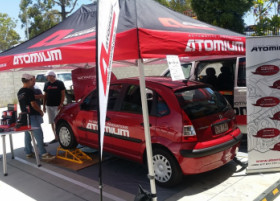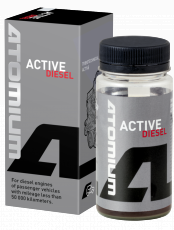Do you think it's easy for a car to run in summer? It is just a popular belief that if a car wasn't driven in winter, it'll stay in a better condition! Of course, there are no winter cold starts that scratch the cylinder walls and crankshaft necks like a file, as well as no long heating periods and reagents on the road… But summer, too, offers some problems that do not make an engine feel better. It's not that obvious what's better: to start a car a couple of times when it's -20 °C outside, or to spend an hour in a traffic jam when the temperature hits +35 °C in sunshine.
What's the problem? How did Alexander Pushkin put it? "O, summer fair! I would have loved you, too, Except for heat and dust and gnats and flies…" Well, gnats and flies are fine but heat and dust are no piece of cake for an engine. Especially, the heat.
Motor oil additive for restoring engine performance characteristics: compression, power, acceleration, effective fuel consumption, as well as for extending the wear life and protection in emergency situations.
THAT'S ALL TALK, LET'S SEE HOW IT WORKS
An engine has a special liquid called the engine oil. And rumor has it that it serves to lubricate the components. That is to form oil films that separate the surfaces of contacting parts, reduce friction and prevent wear and tear. The most important oil characteristic that affects the lubricating effect on the components is the oil viscosity. It reduces when the temperature rises.
How much? Let's take the most commonly used engine oil – the "fully synthetic" 5W40. At 100 °С the oil viscosity is about 14 cSt (it's the measuring unit), at 150 °С it reduces down to 5.5 cSt, at 200 °С it is 3 cSt, and at 230 °С it reduces down to 2 cSt. How much is that? Roughly speaking, it's like a winter diesel fuel oil…
Now back to the engine. Under normal traffic conditions, the oil sump is blown by the ram air, and the temperature of this oil, even in summer, is rather stable, ranging between 90 and 100 degrees Celsius. But if, in summer, the car finds itself in a traffic jam, right in the sun, and the asphalt is burning up, the oil temperature starts increasing. The engine oil viscosity reduces, and the lubrication of the contacting parts deteriorates all the way to the total loss of the lubricating and separating layer. Besides, it becomes noticeable without any special experiments: many drivers have noticed that when you finally get out of a jam, at first, the car moves reluctantly. The engine needs some time to restore its normal conditions for lubricating the parts. But the load is already there, which ruins the faces of the parts.
And the most dangerous thing is that we don't see it! On the dashboard, we can see the coolant temperature that is maintained by stable operation of the thermostat, radiator and its fan. The oil sump in its turn is not cooled when the car is stationary, and in most cases we shall notice that something is wrong only when the engine oil pressure lamp starts blinking. And that is too late because wear processes are already there.
Of course, if normal lubricating layers are deteriorated, special extreme pressure additives and anti-wear additives that enter into the composition of any engine oil should come into operation. But the thing is that this group of additives "lives" least of all in oil. And 2000-3000 kilometers after it has been changed their efficiency reduces sharply.
ATOMIUM has developed and brought into the market a new series of engine oils Atomium. Oils 5W-30and 5W-40 comprise innovative additive package and truly high-quality base:
- without hydrocracking products;
- composed of completely-synthetic polyalphaolefins and no less than 5% of compound ethers.
Even worse when the engine is sort of beaten up. Old engines are like old people – they especially don't like the heat. In this case, the problems will grow like an avalanche. A hot engine increases the oil consumption. During combustion, the oil will be forming deposits. The deposits in its turn prevent normal heat removal from the cylinders. It further increases the engine temperatures. Decomposition products of oil block the piston grooves, and the piston rings stop working. It begins with a smoking engine, worsening linkage and reluctant starts. That is a straight way to real galling, which require an engine overhaul at best.
We cannot order and get a cool summer but we can prepare the engine to the summer heat. How to do that? Firstly, we need to try to protect them from wear that increases inevitably at elevated temperatures of the engine oil. Secondly, we need to spoil the engine's appetite for oil to reduce the risk of contamination by the decomposition products. Thirdly, we need to remove inner and outer deposits because they prevent normal operation of the cooling system.
ENGINE TREATMENT
All of this can be done by treating the engine with a tribotechnical compound ATOMIUM. compound ensures formation of special protective layers on all of the frictional areas, which results in reduced wear and friction, especially when normal lubricating mode is broken due to some reasons (including oil overheating). Compared to extreme pressure additives and anti-wear additives that enter into the composition of standard engine oil, these layers are long-playing; the treatment effect is maintained through 40,000-50,000 kilometers of the car run. Moreover, even in case of complete oil starvation of the friction joints, these protective layers allow to keep engine functioning at least for the period of time that is needed to drive to the nearest car service.
The engine will respond to the treatment with better dynamics, reduced fuel consumption, and reduced toxic exhaust, which also is important. Besides, during the treatment process old deposits accumulated in the prior operating period are removed from the friction areas. Also, as a result of the treatment, the burning oil consumption reduces sharply, which is very important when a hot summer is just around the corner.
Obviously, ATOMIUM additives cannot cancel the heat and remove traffic jams but they can make the car's life easier in summer and survive it with minimal losses.
Alexander Shabanov (Candidate of Technical Sciences, expert of "Za Rulem" automobile magazine)

